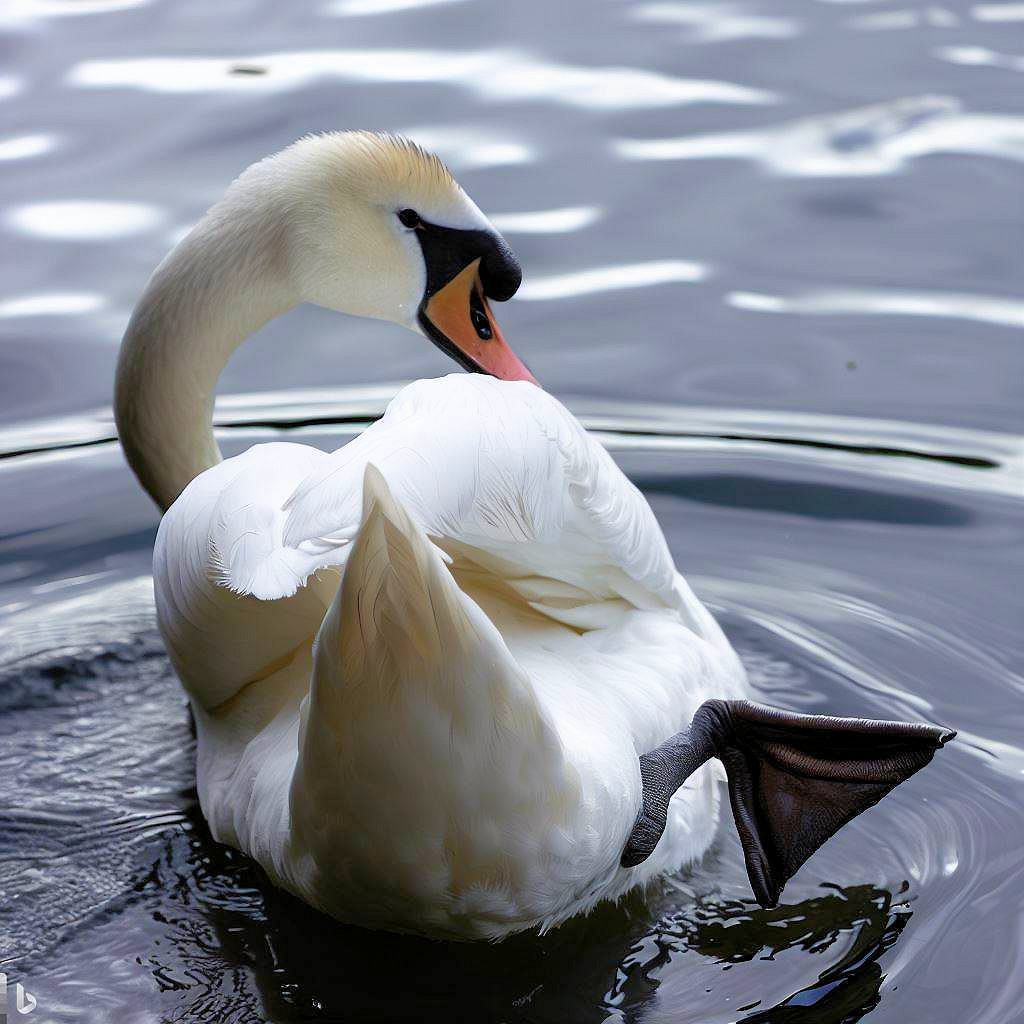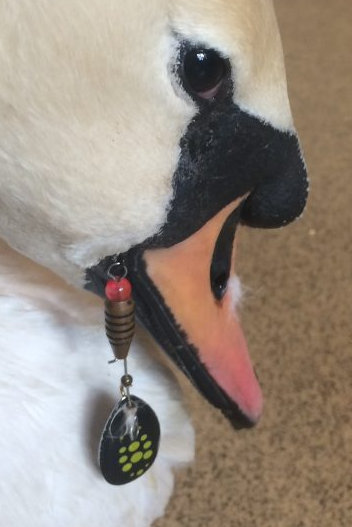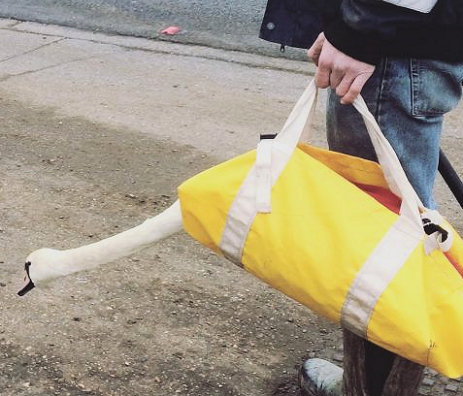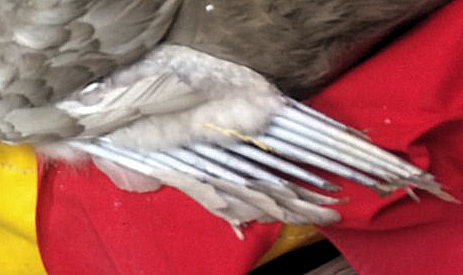Advice for Injured Swans
See also: Injured Swan or Normal Behaviour?
Common Injuries
If you have found a swan and are worried about its condition / location - or a juvenile/cygnet that is in distress or has been abandoned - please call us on
Rescue Area
CLICK HERE TO OPEN A MAP OF OUR RESCUE AREA
Our rescue area is a 50km radius from our Treatment HQ in Eton, Berkshire and covers Newbury to the west, Rickmansworth to the north, Staines-upon-Thames to the east and Farnham to the south. For rescues outside of this area, please visit the Help Wildlife website.
The following information should assist you if you come across a swan that you believe to be injured or unwell.
We encourage members of the public to take photographs/videos of any noticeable injuries or concerns as this can help us to identify the best course of action. Please email them to enquiries@swanlifeline.uk or call us on the number above and we can provide a direct mobile number to send through any images if required.
If possible, please also provide the position in What3Words.
Avian Influenza
The Avian Flu season is now not limited to just a few months over the winter, and reports have been confirmed every week since October 2021.
What are the common signs of Avian Flu?
Swans, juveniles and cygnets will be lethargic, sleepy and may not want to feed. They will likely be on their own and show signs of a droopy neck and glazed eyes. The most obvious sign is if they start spinning in circles as the virus attacks its central nervous system - this can be disturbing to see but the swan will likely not know what's happening to it by then.
What can you do about a swan with Avian Flu?
Unfortunately nothing can be done. There is no treatment for avian flu. Some swans with healthier immune systems can recover and there's increased data showing that they do become immune from that strain, however, new strains are appearing with migrating birds all the time.
If we were to take a bird away with Avian Flu, we would be legally obliged to report that we had it (it's a £10,000 fine otherwise) and all our other swans that we've been keeping safe would be euthanised, along with the one we rescued.
Should we keep feeding swans?
Absolutely! The healthier they are, the more chance they have of recovery. Please don't feed swans in a flock all together - try to spread out the food so that the swans aren't on top of each other. Bread is fine during the winter (make sure there's absolutely no mould, or they could catch botulism) but floating swan & duck food is better, along with chopped up lettuce, kale, baby spinach, sweetcorn and (defrosted) frozen peas. The vegetables will give them many more nutrients than bread and a better chance of fighting off disease and viruses.
Can humans catch Avian Flu?
There was a case of a gentleman who kept a number of ducks in his house, who caught it recently, but the chances of humans catching it are small. However, the advice is to never touch a bird with suspected Avian Flu, as you could spread the virus elsewhere. If you are in an area with Avian Flu (or even suspected Avian Flu) then also disinfect the soles of your shoes/boots at the first chance you have, to avoid spreading it elsewhere.
What do I do if I find a dead swan?
You should call the Defra helpline (03459 33 55 77) if you find a) 1 or more dead birds of prey or owls; b) 3 or more dead gulls or wild waterfowl (swans, geese and ducks); or 5 or more dead birds of any species. Your local council should remove any dead birds. For single dead wildfowl, please contact your local council's environmental health department.
Common Injuries
What to do if you find a swan on a road or a back garden?
Swans often mistake roads for a river, especially if it's been raining but they can also mis-time a landing or crash land where they aren't supposed to be. If you find a swan on a road or somewhere not near its natural habitat, please call us, so we can collect it, check it's healthy and release it or take it to our treatment centre, if needed.
 Feet
Feet
Swans put their feet on their backs, hang them out sideways or tuck a foot under a wing - both in and out of the water. This is to warm their feet up or to cool them down. Sometimes the foot is closed and sometimes held open. It's a lot like someone sticking a foot outside of their duvet to cool down!
Both adult swans and older cygnets/juveniles display this behaviour and it is quite normal but can sometimes be mistaken for a leg injury. They will look like they are laboured in their swimming, as one foot is doing the job of two - and having to be used as a single tiller - but if everything else seems OK with the swan, then this is fine.
Legs
Swans walk awkwardly when on land and can appear to “waddle” like a duck. Swans and cygnets will also stand on one leg for long periods of time. This is normal but if you see a swan with a definite limp or one that cannot bear weight on one foot, it is best to contact us.
Beaks

Signs of hook and line injuries are usually obvious and you should contact us if you see a swan with a fishing hook in its beak or head. If you suspect an injury of this type but only the fishing line is visible, this could be more troubling as it may indicate that the swan has swallowed the hook, which can be life threatening.
Certain weed from the river bed can look like fishing line when it hangs from the beak. The next time the swan dips down for food, this should resolve itself.
Wings
Obvious signs of wing injuries, accompanied by the presence of blood, should be reported immediately, especially if the swan is in an unexpected area or seems unable to move.
Swans naturally stretch their wings, one at a time, and lay them down the length of their bodies, this is normal and the wing will be retracted to its correct position shortly.
Dog attacks
Unfortunately, dog attacks to swans are on the increase. If you witness a dog attack, please telephone the police on 101 and ask to report the incident to the wildlife crime officer.
We cannot report dog attacks to the police after the event. Reports can only be made by the witness to the attack. Without putting yourself in any danger, please get as much information as possible before telephoning the police.
We should be informed immediately if a swan has been attacked as the quicker we can start treatment, the better chance the swan will have of recovering from its injuries.
Moulting
From Summer onwards, swans moult. The process makes their wings look very ragged and when surrounded by their feathers it can look as if a swan has been attacked. An adult swan can have as many as 25,000 feathers so losing some during the annual moult is perfectly normal. If you are concerned, please contact us for advice.
Environment

If you see a swan in an unusual area, it should be reported as soon as possible. It is likely to have become trapped during a territorial dispute and will be unable to move.
Swans and their cygnets do go walkabout! This is normal, however if they have wandered into an area that is unsafe for them they will need to be moved. Please telephone us for advice.
Cygnets can become separated from their parents at any age. They will need to be returned as soon as possible or this may indicate that the cygnet has been rejected by its parents. Please telephone us is you have concerns.
Cygnets
Cygnets will begin to leave their parents from the Autumn through to the Spring of the following year after hatching. This can happen without anyone noticing and it is quite normal for a family to suddenly get much smaller overnight.
Some cygnets are reluctant to leave and are chased off by the parents. This can look very brutal and can sometimes appear like an attack but is quite normal. If the cygnet decides to venture back to its parents, it will be chased off again. Parents can kill their offspring if they do not leave, and as awful as this is to witness, it is unfortunately a normal part of swan’s life. If you come across a situation like this, please let us know immediately.
Cygnets are not very adept fliers and if they take off for the first time during windy or wet Autumnal or Winter weather it can lead to accidents. Please telephone us immediately if you find a cygnet anywhere, on its own, and especially if it is nowhere near a waterway.
Angel wing

Cygnets can suffer from this syndrome from an early age. The wings appear to stick out from the body at an angle and do not sit against the body. The wing tips can look tatty. Please telephone us immediately for advice as the sooner we start treatment, the better the outcome.
The bandages are changed every day for seven to 10 days while the feathers continue to grow. The results from this treatment tends to be excellent and the cygnet will be able to fly normally.
General ill health
If you find a swan or cygnet that generally looks unwell, is unable to stand, hold its head up or has damaged feathers please telephone us immediately as it could be an indication of botulism or poisoning. The sooner we can assess the situation and start treatment, the better it will be for the swan.
